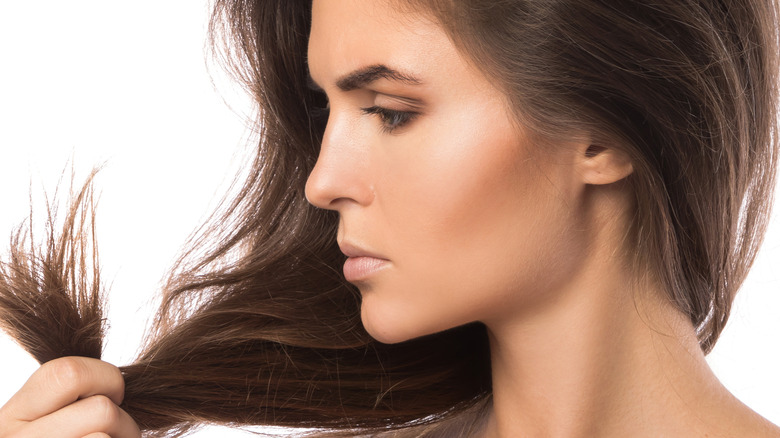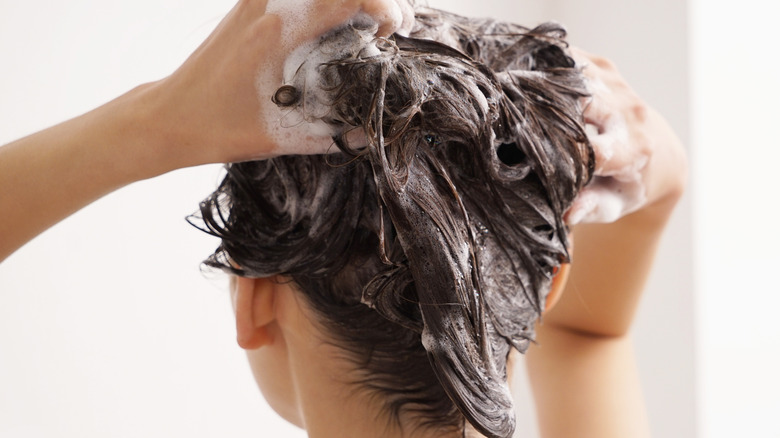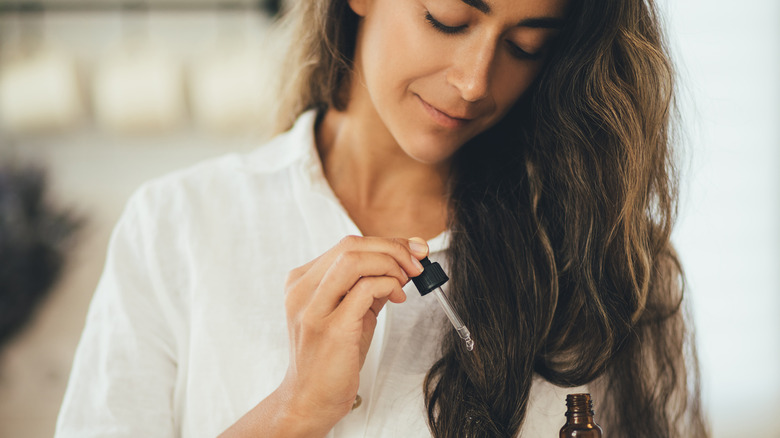This Common Haircare Habit May Actually Be Causing Split Ends
Struggling with split ends? If so, it might be time to rethink your hair care regimen. Excessive brushing, heat styling, bleaching, and chemical damage can all affect your hair. Revalid explains that splitting may occur anywhere on a strand of hair, and can take several forms, depending on the severity of the damage. Sometimes, this problem is due to environmental factors, such as exposure to sunlight, or poor nutritional habits.
The hair shaft consists of three layers: the cortex, the cuticle, and the medulla. When your hair splits, it's the medulla that becomes damaged, explains a 2015 review published in the International Journal of Trichology. While it's not possible to repair split ends, you can prevent their occurrence and keep them from getting worse. What matters most is to figure out the cause and then take the steps needed to restore your locks. For example, you could start by switching to a different shampoo or pre-treating your hair before stepping into the shower.
Avoid this common mistake to prevent split ends
You may think that washing your hair more often is a good habit, but that's not necessarily the case. On the contrary, over-washing can affect the scalp and hair, leading to split ends. Still, though, over-washing is just one of the mistakes you're making that are causing split ends. "Wet hair is so extra susceptible to damage and breakage, so the more you wash it, the more opportunity it has to break," celebrity stylist Tonya Lee told Insider. Over time, this habit can dry out your hair and increase frizz while stripping away the protective oils secreted by your scalp.
Over-shampooing can further affect the hair, warns Lee. "Minimizing your shampoo sessions will give your oil glands a chance to do their job and soothe the scalp naturally," Lee continued. If you use shampoo more often than necessary, you might end up with dandruff and dull hair. Plus, your locks will become more vulnerable to damage. The shampoos designed for daily use can cause more harm than good, according to a 2010 review featured in the International Journal of Trichology. These products rarely contain conditioners or other protective ingredients, and may affect the hair shaft itself.
What's the best way to wash your hair?
While there are no set rules on how often to wash your hair, you shouldn't go overboard. "Even with daily exercise, you don't need to wash your hair daily," Dermatologist Shilpi Khetarpal told the Cleveland Clinic. Generally, greasy hair requires more frequent washing, but you still shouldn't wash your hair every day. You also need to take into account your age, hair type, length, activity level, and ethnic background, explains Dr. Khetarpal. For example, people with long hair tend to have dry ends — and frequent washing can strip away the oils that keep them moisturized.
As far as shampooing goes, it's not necessary to do it every time you wash your hair. Hairstylist Alli Webb told WebMD that it's perfectly fine to skip the shampoo for days at a time, especially if your hair is thick or dry. Alternately, consider using dry shampoo to keep your locks clean and neat between washes.
Another recommendation comes from trichologist Bridgette Hill. In a recent interview with MindBodyGreen, she said that it's best to apply coconut, jojoba, argan, or olive oils to your hair before using shampoo. This simple habit can reduce the damage associated with hair washing and lock in moisture. In the long run, it may result in fewer split ends and stronger, healthier hair.


